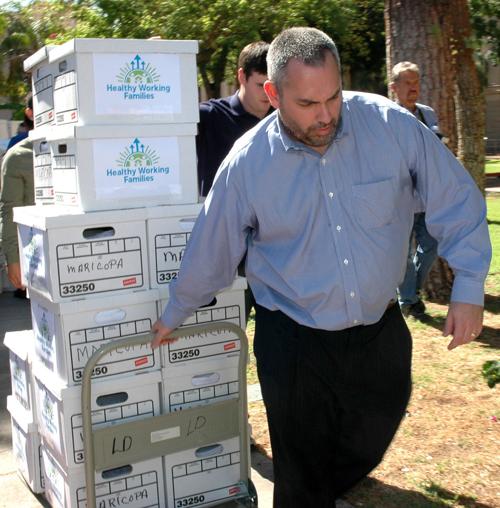PHOENIX — A judge ruled Thursday that dozens of people who circulated petitions to put a minimum-wage increase on the state ballot were not legally qualified to do so.
Maricopa County Superior Court Judge Joshua Rogers said Arizona law requires residents from other states and those who are being paid to collect signatures to register with the Secretary of State’s Office. That registration must have an address where someone raising questions about petitions can find the petition circulators and, if necessary, serve them with legal papers.
These circulators had not complied. That, in turn, means none of the signatures they collected can be counted.
But the ruling does not necessarily knock the measure off the ballot. Due to the nature of the verification process, it could take days to see if the number of affected signatures is enough to leave proponents of the initiative without at least the legally required 150,642 valid names.
At stake is whether voters will get to decide in November if the minimum wage should be raised immediately to $10. There would be step increases to $12 by 2020, with future raises linked to inflation.
The current state minimum wage is $8.05 an hour.
Opposition is being led by the Arizona Restaurant Association. Foes contend such a large increase would harm businesses, forcing them to raise costs and lay off workers. They are trying to keep the issue from getting on the ballot.
“In Arizona, there is a privilege to be able to use out-of-state and paid circulators to circulate petitions to gather signatures to qualify ballot measures,” attorney Roopali Desai, representing challengers, told Rogers. “But that privilege is not without certain restrictions.”
She said lawmakers decided that special attention needs to be paid to those who make a living gathering signatures.
“They come in, they get paid per signature to collect as many signatures as they can,” Desai said. “And they’re not always paying attention to or being informed about the laws in the states where they’re circulating petitions.”
That includes the requirement for an in-state address.
The easiest cut for Rogers to make was of circulators who didn’t provide that in-state address. But the judge was not as responsive to various other claims by challengers, such as questions of whether there was sufficient evidence to show one or more circulators were felons and therefore legally ineligible to collect signatures.





